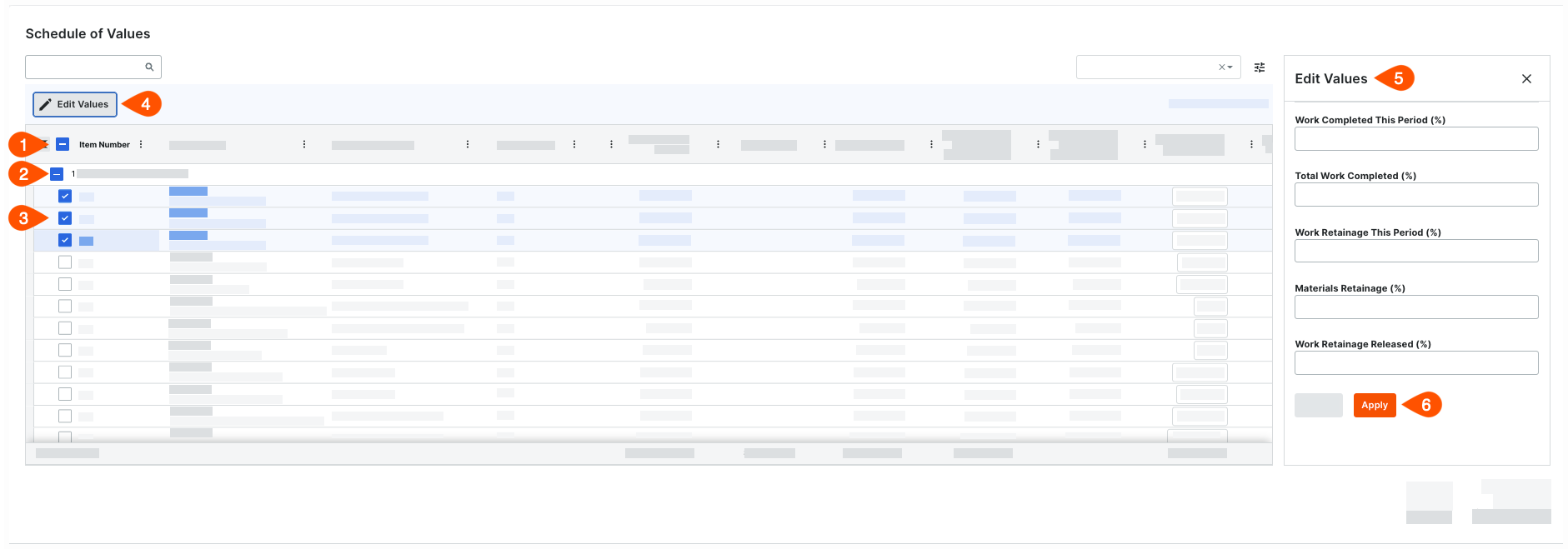Edit Owner Invoices (Beta)
Objective
To edit an owner invoice for a prime contract.
Background
After creating an owner invoice, you can open it using the Project level Prime Contracts or Invoicing tool to edit as needed. The steps below show you how to edit an owner invoice using the Prime Contracts tool.
Things to Consider
- Required User Permissions:
- 'Admin' level permissions on the project's Prime Contracts tool.
- Additional Information:
- You can only edit the most recently created invoice.
- To learn how to use group row billing, see About Group Row Billing on Owner Invoices
Prerequisites
Steps
- Open an Invoice
Open an Invoice
- Navigate to the project's Prime Contracts tool.
- In the table, locate the contract to edit.
Tip
- Looking for a specific invoice? To quickly find a match in a long list of invoices, start typing in the Search box. Procore narrows the list to show only the invoices that match your keywords.
- Want to organize the invoices in the Owner list? To organize the invoice table, use the options in the Add Group and Add Filter menus. To learn more, see Search, Filter, and Group Invoices.
- Click the contract's Number link to open it.
- Click the Invoices tab.
- Locate the invoice in the Invoices (Payment Applications) tab.
- Click the Invoice Position or Invoice # link to open it.
Procore opens the invoice. You have different editing options on each card in the invoice.
Update the General Information
To update the invoice's general information:
- Scroll to General Information.
- Click Edit.
- Update these fields as needed:
Note
An asterisk (*) below indicates the field is required.
- Status
Choose a status from the drop-down list. The default status of a new invoice is Draft. See What are the default statuses for Procore invoices? - Invoice No.
Change the invoice number, if appropriate. - Billing Period.*
Procore automatically populates the drop-down menu with the project's open billing period. If there isn't an open billing period, Procore selects the most recent billing period.Tips
Not seeing a menu option for the current billing period? To learn how to create a billing period, see Create Billing Periods. - Period Start
Procore automatically shows the start date of the selected billing period. - Period End
Procore automatically shows the end date of the selected billing period.
- Status
- Click Save.
View a Summary Preview
To preview the invoice in its finished layout:
- Scroll to the Summary Preview section.
- Click the arrow to expand it.

Click here to view an example of the Summary Preview.
Summary Preview: Upstream Invoice
The Summary Preview lets you view the finished layout of your upstream invoice.
Example
Below is an example of an owner invoice created with the Prime Contracts tool. You'll notice slight field labeling differences, if you are viewing an upstream invoice created with one of these Project Tools:
- A GC/Client invoice is created with the Client Contracts tool.
- A funding invoice is created with the Funding tool.
The layout of a Summary Preview always matches the example below.
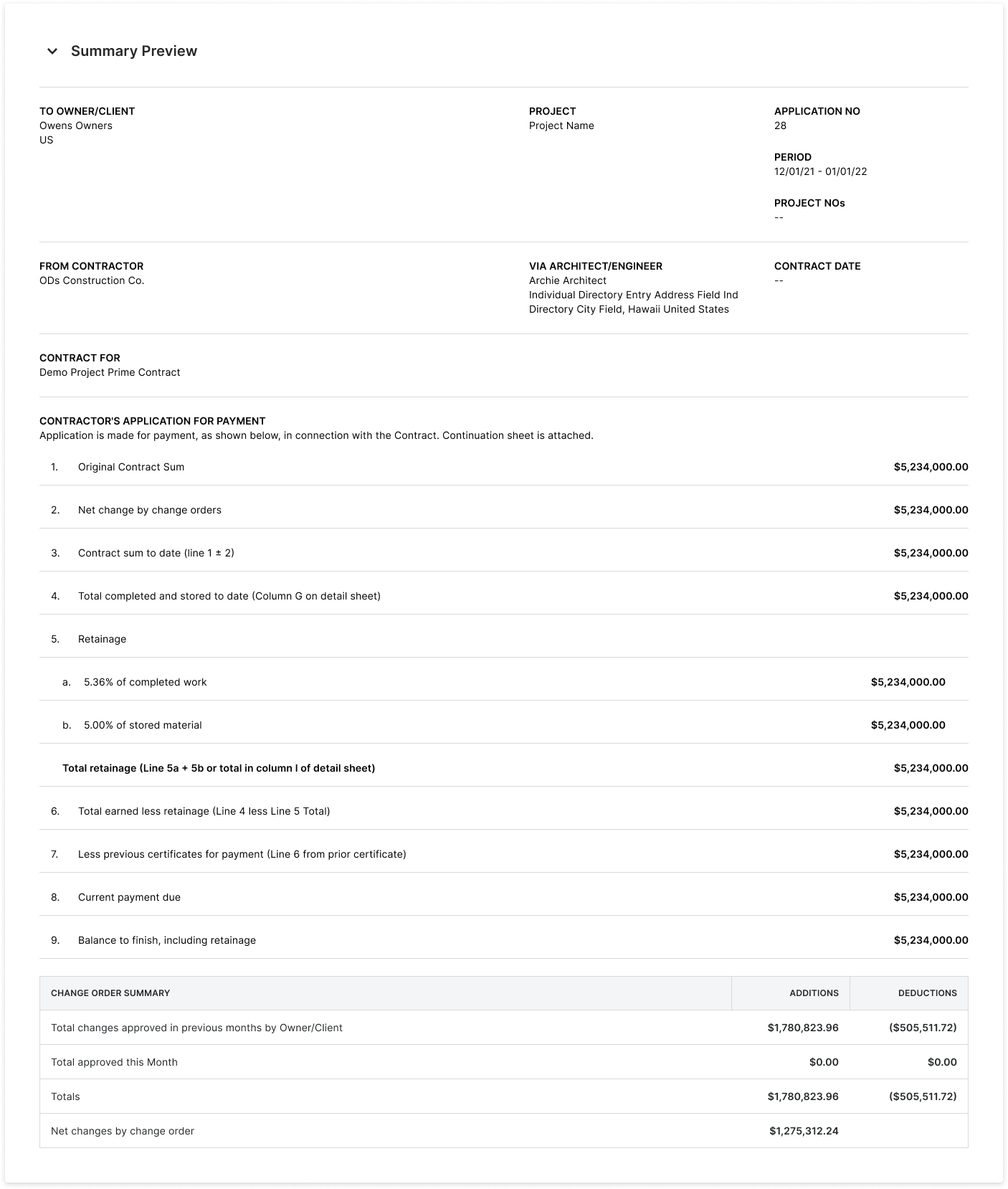
Summary Preview - General Information
The table below details each field in the General Information area of an owner invoice.
| Field | Description | Project Tool | Source Field(s) |
|---|---|---|---|
| To Owner/Client or GC/Client | Shows the name of the Owner/Client or GC/Client as specified in the contract or funding. | Directory, Prime Contracts | Owner/Client or GC/Client |
| Project | Shows the name of the project as specified in the Project Number field in the Project Information area of the Project Details page. | Portfolio | Project Number |
| Application No. | Shows the invoice number specified on the invoice. | Invoicing | Invoice No. |
| Period | Shows the billing period for the invoice. | Invoicing | Billing Period |
| Project Nos. | Show the Procore project numbers. | Portfolio | |
| From Contractor | Shows the name of the primary contractor managing the project | Prime Contracts | Contractor |
| Via Architect/Engineer | Shows the name of the Architect/Engineer as specified on the contract. | Prime Contracts | Architect/Engineer |
| Contract Date | Shows the effective date of the contract. This is the date the contract went into force. | Prime Contracts | |
| Contract For | Shows the name of the project as specified in the Project Number field in the Project Information area of the Project Details page. | Prime Contracts |
Summary Preview - Contractor's Application for Payment
The table below provides details about each field in the Contractor's Application for Payment area of an owner invoice.
| Line | Field | Description | Project Tool | Source Field(s) |
|---|---|---|---|---|
| 1 | Original Contract Sum | Show the amount recorded in the 'Original Contract Amount' field in the contract. | Prime Contracts | Original Contract Amount |
| 2 | Net Change by Change Orders | Shows the total amount of any change orders in the Approved status that impact this invoice. | Prime Contracts, Change Orders | |
| 3 | Contract Sum to Date (Line 1 ± 2) | Shows the sum or difference of the Original Contract Sum (line 1) combined with the Net Change by Change Orders amount (line 2). This shows the positive or negative cost resulting from any approved change orders. See the Summary Preview - Change Order Summary. | Prime Contracts, Change Orders | |
| 4 | Total Completed and Stored to Date (Column G on Detail Sheet) | Procore adds the Work Completed and Materials Presently Stored values to show the cumulative sum of the cost for each line item on the invoice. | Invoicing | |
| 5 | Retainage | Shows the percentage of the payment is being withheld until the job is complete. This value is specified in the contract. Typically, the value is between 5% and 10% for each progress payment. Because some regions require variable retention, the 'Retainage' amount may only be reduced once a certain percentage of the contract is complete. |
Prime Contracts | |
| 5a | % of Completed Work | Shows the percentage of work completed from previous payment applications plus the work completed for this billing period. | Invoicing | |
| 5b | % of Stored Materials | Shows the percentage of materials being stored on-site. This reflects the value of the materials that were purchased for, but not used on, the project up to the end of the invoice's billing period. | Invoicing | |
| - | Total Retainage (Line 5a + 5b or Total in Column I on Detail Sheet) | Shows the variable retainage rate. A variable retainage rate can represent one of two rates: (1) The amount of retainage that is reduced after a certain percentage of work is complete, or (2) the amount of retainage that retainage applies only to labor and NOT to materials. Note: If you are withholding a fixed percentage throughout the entire project, you will not use this field. |
Invoicing | |
| 6 | Total Earned Less Retainage (Line 4 less Line 5 Total) | Shows the Work Completed and Materials Stored Amount | Invoicing | |
| 7 | Less Previous Certifications for Payment (Line 6 from Prior Certificate) | Shows all previous payments for the contract. On the first invoice, this number is zero (0). On subsequent invoices, the amount matches line 6 on the previous invoice. | Invoicing | Total Earned Less Retainage (from previous invoice) |
| 8 | Current Payment Due | Shows the current payment due for the invoice's billing period. This calculation takes the 'Total Completed and Stored to Date' value in the invoice minus 'Retainage' and any completed payments from past invoices. | Invoicing | Calculated |
| 9 | Balance to Finish, Including Retainage | Shows the amount remaining to be paid on the contract, including the 'Retainage' amount. | Invoicing | Calculated |
Summary Preview - Change Order Summary
The table below provides details about each field in the Change Order Summary area of an owner invoice.
| Field | Description | Project Tool | Source Field(s) |
|---|---|---|---|
| Total Changes Approved in Previous Months by Owner/Client | Shows the total amount of any change orders that were Approved during previous billing periods. | Prime Contracts, Client Contracts, Funding, Change Orders, Invoicing, Progress Billings | Calculated |
| Total Approved this Month | Shows the total amount of any change orders that were Approved during the current billing period. | Prime Contracts, Client Contracts, Funding, Change Orders, Invoicing, Progress Billings | Calculated |
| Totals | Shows the total amount of all Approved change orders. | Invoicing | Calculated |
| Net Changes by Change Order | Shows the net change to the total amount for this invoice. | Prime Contracts, Client Contracts, Funding, Change Orders | Calculated |
Review & Add Approved Changes
If your team approves new budget changes or prime contract change orders after an owner invoice is created, a notification banner appears at the top of the invoice's Schedule of Values.
If you want to add any newly approved changes to the most recent owner invoice, follow these steps:
- At the top of the Schedule of Values, click Review & Add the notification banner.

Tips
- Don't see a notification banner? Either (1) there are no approved changes to add to the invoice, or (2) the required 'Budget Changes' settings aren't configured. See Configure Settings: Budget.
- Can't click the Review & Add button? Approved changes can only be added to a prime contract's most recent invoice. If you are editing an older invoice, you can't click the Review & Add button.
- Are approved changes added to new owner invoices automatically? Yes. Approved changes are automatically added to the Schedule of Values on a new invoice. You do not need to add approved changes to new owner invoices.
- In the Review & Add Approved Changes window, review the adjustment details.
- Mark the check boxes next to the changes to add.
Important
Adding approved changes is a permanent action. Once added, they cannot be removed.
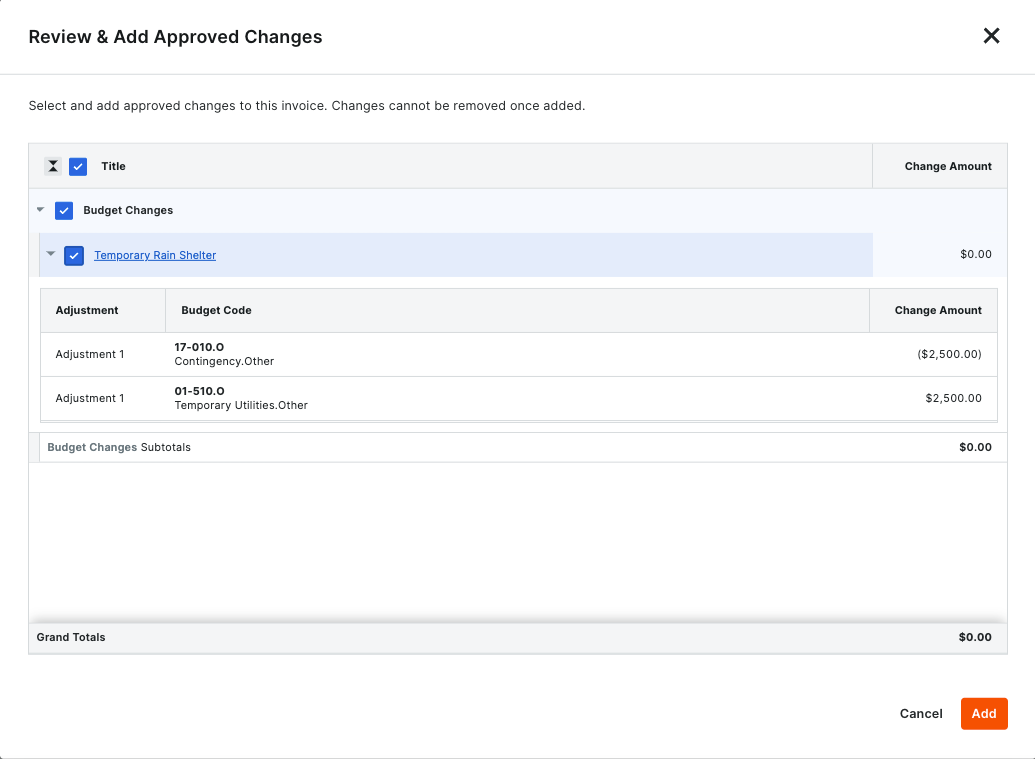
- Choose from the options:
- To add the selected changes, mark the checkboxes that correspond to the change and then, click Add.
A GREEN banner appears when the change is successfully added.
OR - To skip adding the changes, click Cancel.
- To add the selected changes, mark the checkboxes that correspond to the change and then, click Add.
Update the Schedule of Values
Before updating the line items, it's helpful to understand the available editing methods. It's also important to know that the accounting method set on the prime contract impacts which columns are available for data entry on the Schedule of Values.
To update a schedule of values:
- View the Schedule of Values in Full Screen
- Set the Column View for PDF Exports
- Search for Matching Line Items
- Manage Custom Groups
- Manage Table Settings
- Choose Your Editing Method
- Update the Line Items Using the Contract's Accounting Method
View the Schedule of Values in Full Screen
You can view the Schedule of Values in full screen and close it when you finish your updates.
  |
To open or close the fullscreen view of the Schedule of Values:
|
Set the Column View for PDF Exports
You can configure the SOV's column view before you Export Owner Invoices.
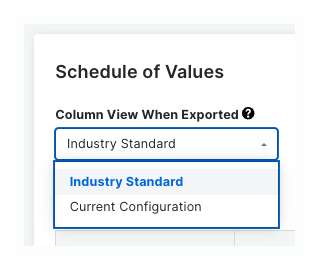 |
Choose an option from the drop-down list:
|
Search for Matching Line Items
You can search for the matching line items to edit.
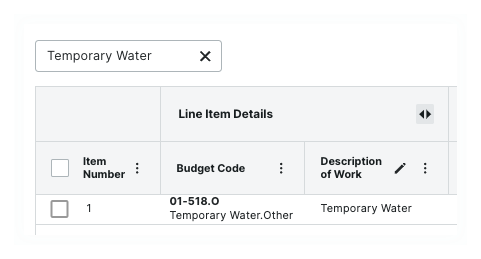 |
About the Search ScopeThe scope of a search includes:
Search for Line ItemsTo search for matching line items:
|
Manage Custom Groups
You can create, edit, or delete custom grouping options. Once you've created your groups, you can apply them using the drop-down menu to the left of the 'Manage Custom Groups' button.
 |
Add, Edit, or Delete Custom Groups
|
 |
Assign Line Items to Custom Groups
|
 |
Apply Custom GroupsApply the groups to the table using the drop-down menu to the left of the 'Manage Custom Groups' button. You have these options:
|
Manage Table Settings
You can change the row height for the Schedule of Values. You can also show or hide the columns that appear.
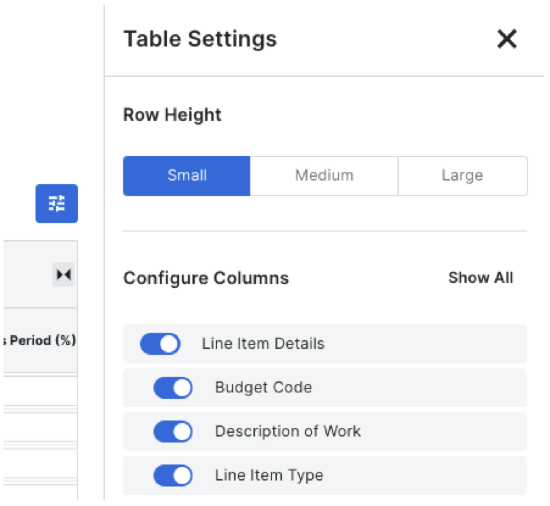 |
Set Row Height
Configure Columns
|
Choose Your Editing Method
It's helpful to understand the differences between the two (2) available data entry methods for contracts. See How do I set the accounting method for a contract? Once you know the accounting method in place, click the Edit button to place the Schedule of Values in editing mode. You can only edit the most recent invoice. If there is a more recent invoice, an informational message appears at the top of the Schedule of Values.
- To edit individual line items inline Show/Hide
- To edit line items in bulk Show/Hide
Update the Line Items Using the Contract's Accounting Method
The data entry requirements for line items on a Schedule of Values are determined by the accounting method set on the invoice's prime contract. In Procore, a prime contract can be configured to use one (1) of two (2) accounting methods: Amount-Based or Unit/Quantity Based. The accounting method set on the prime contract impacts which columns are available for data entry on the Schedule of Values. Once line items are created on a contract, all invoices for that contract use the same accounting method. To learn more, see How do I set the accounting method for a contract or funding?
Tips
How do you know which accounting method is being used? An Amount-Based contract includes columns for entering dollar and percentage amounts. A Unit/Quantity Based contract includes columns for entering a quantity and percentage amounts. Simply compare the columns in your invoice's Schedule of Values to the ones in the examples below.
- To update line items with the Amount-Based accounting method Show/Hide
- To update line items with the Unit/Quantity Based accounting method Show/Hide
Upload Attachments
When creating an invoice, users have the option to place a mark in the Include backup from direct costs and invoices in the selected billing period box. The experience you see will depend on whether the setting is turned ON or OFF.
include backup from direct costs and invoices in the Selected Billing Period
If the Include backup from direct costs and invoices in the selected billing period setting is turned ON.
- Scroll to Attachments.
- Click Edit.
Scroll to the Attachments card.Note
When the Include backup from direct costs and invoices in the selected billing period setting is turned ON, the Attachments card contains these sections: Uploaded Attachments, Attachments from Subcontractor Invoices, and Attachments from Direct Costs.
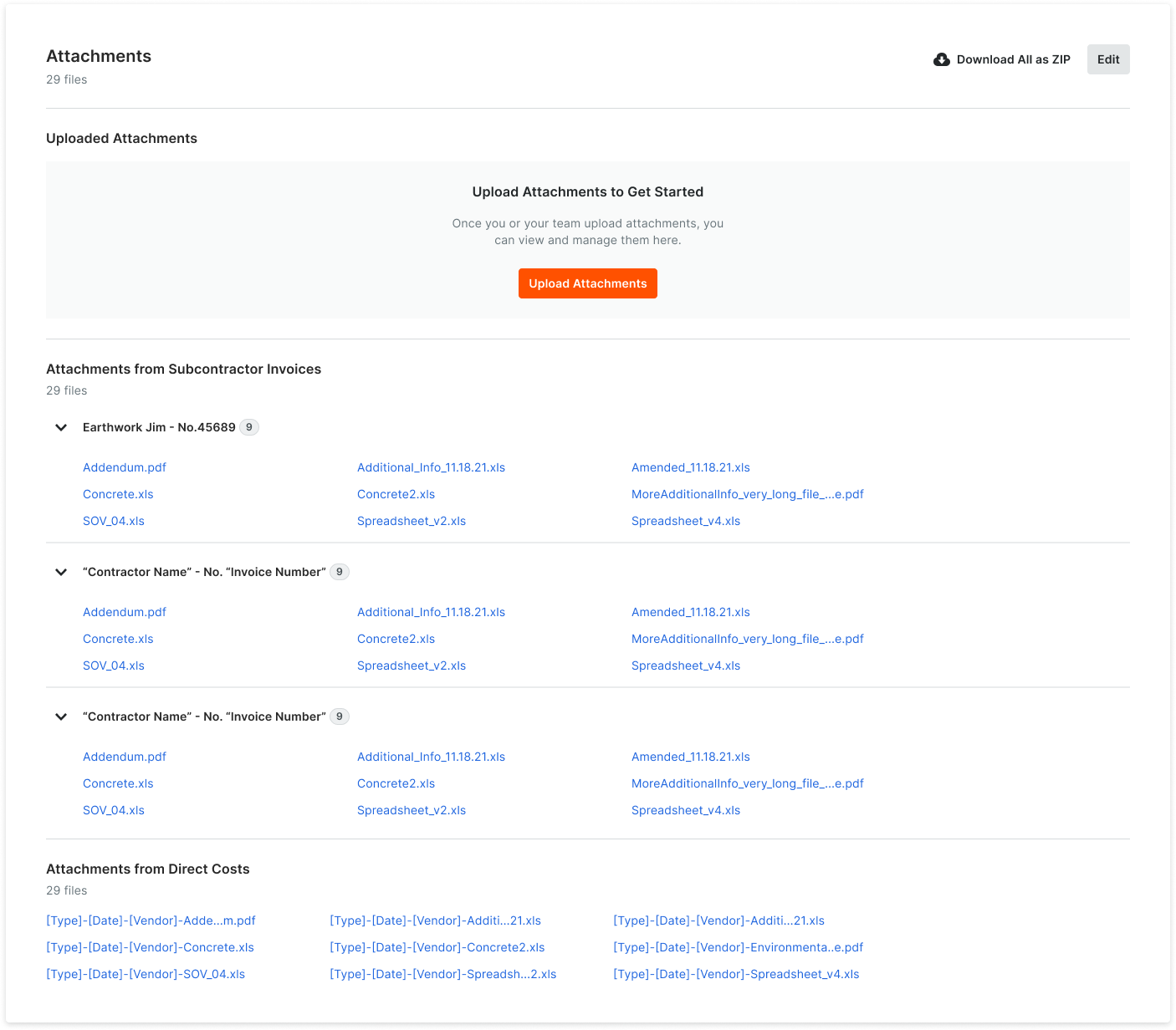
- In the Uploaded Attachments section, click the Upload Attachments button.
- Upload the desired attachments.
Upload Attachments
If the Include backup from direct costs and invoices in the selected billing period setting is turned OFF in the invoice.
- Scroll to Attachments.
- Click Upload Attachments.
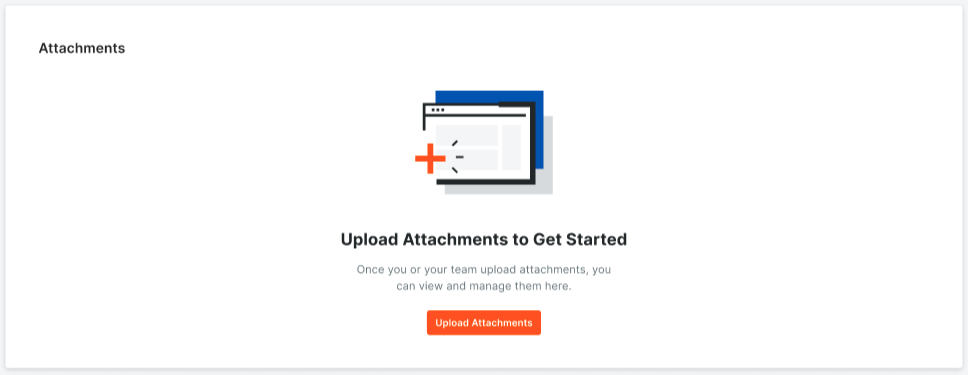
- Upload the desired attachments.



